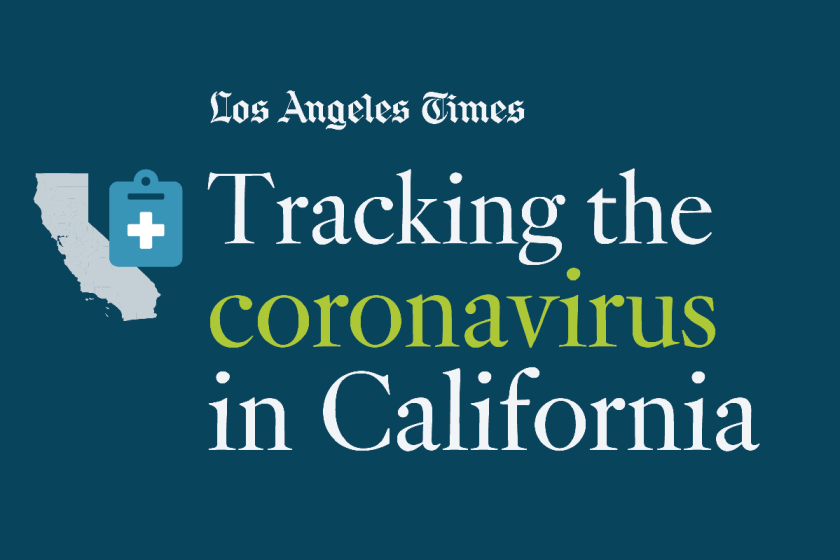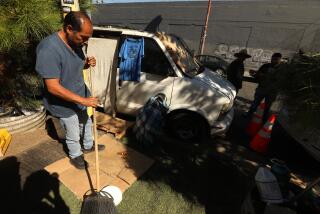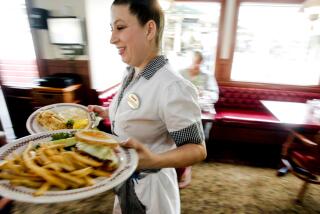Coronavirus forces some L.A. workers to choose between their health or a paycheck
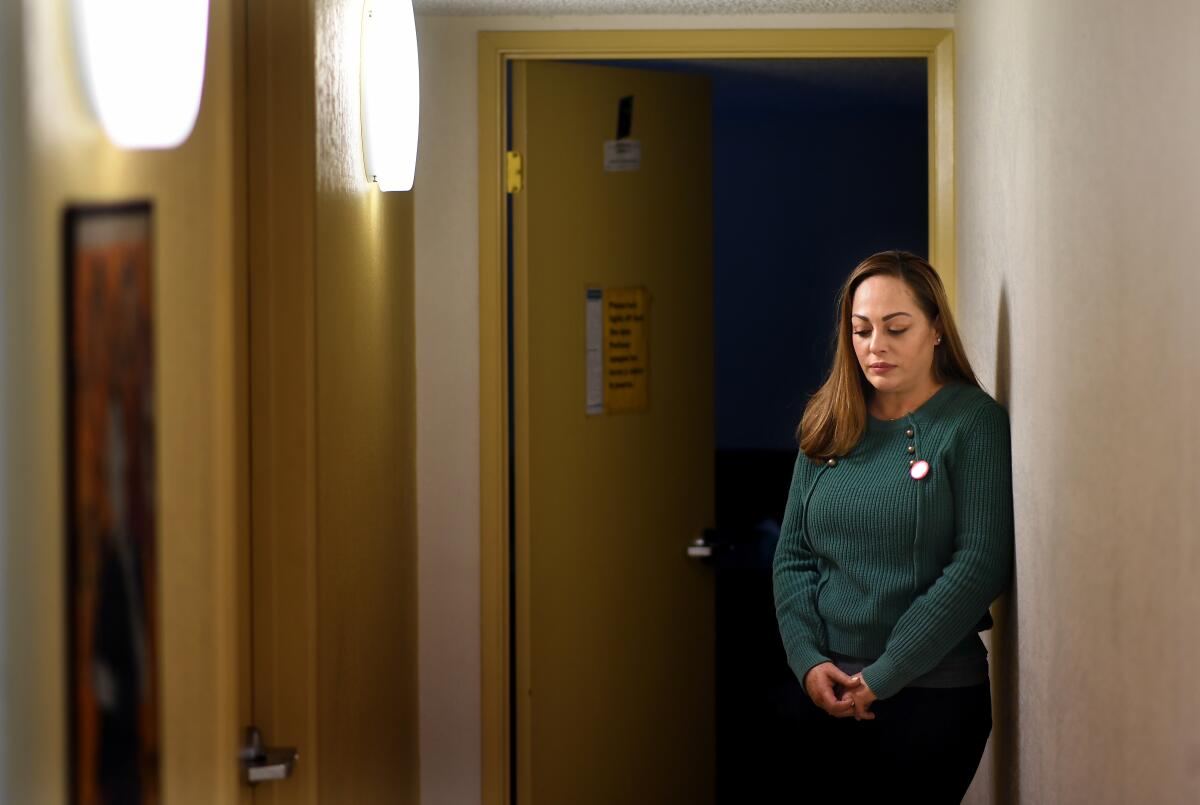
Teresa Trejo has spent the last two decades shuttling between jobs at the L.A. Convention Center and Dodger Stadium. Her work as a barista and a bartender serves as the main source of income for her family, which includes her 7-year-old son, whose fears around the coronavirus have steadily grown.
For Trejo, 46, the effects of the outbreak hit swiftly two weeks ago, when both her workplaces shuttered and her hours were cut indefinitely, forcing her to file for unemployment. Like other Americans who donât have the luxury of a work-from-home option, Trejo is finding that the virus will disproportionately affect those whose livelihoods depend on daily human interaction.
âThis is the first time in my life that I literally have no work, and I donât know when Iâm going back,â she said. Trejoâs family has some money in savings, but she doesnât know how long that will last. Sheâs hopeful that her union can assist.
Trejo, a lifelong Angeleno, and her family live in Inglewood, a city that falls under Los Angeles Countyâs implementation of a retroactive moratorium on no-fault evictions for residential and commercial buildings. The measure is one of many meant to help alleviate the financial burden that the effects of the coronavirus outbreak will cause.
âI donât feel secure. I donât know for how long Iâll be able to survive.â
— Teresa Trejo
But for the immediate future, anxiety reigns. Shows that were planned months in advance at downtown L.A.âs Convention Center have been canceled or suspended â a decision that creates a ripple effect on organizers, participants, vendors and workers like Trejo. And with Major League Baseball delaying the start of the 2020 season for at least two weeks, itâs unclear when Dodger Stadium will reopen.
âI donât feel secure. I donât know for how long Iâll be able to survive.â
The latest maps and charts on the spread of COVID-19 in California.
While workers like Trejo are losing jobs and hours, others face a different, dire challenge: Show up to work, but risk your health.
Laura Pozos, 58, has worked at a McDonaldâs in East Los Angeles for four years, her only source of income to provide for her two children.
At times, sheâs also tasked with cleaning the restrooms. Although she has been told to wash her hands after returning to the kitchen, gloves are not always provided, she said. The restaurant directed questions to corporate McDonaldâs, which was not immediately available for comment.
Last week, President Trump referred to fast-food employees as essential workers, as more Americans turn to at-home food delivery and fast-food options.
But a number of McDonaldâs workers across the country, including Pozos, believe the company has done little to protect employees as fears over the virus grow.
Cooks and cashiers at two corporate McDonaldâs stores in San Jose and Los Angeles went on strike last week after hours were cut and demands for health and safety protections, like supplying gloves and sanitizers, allegedly went ignored, the Fight for 15 group advocating for workersâ protections said in a statement.
In a statement Friday, McDonaldâs USA President Joe Erlinger said the company was working with franchisees to implement âadditional precautionary measures to safeguard the well-being of our customers, crew and communities.â
That includes an increase of surface cleaning and sanitizing throughout the restaurant, Erlinger said.
In addition to the potential of lost wages, Pozos said her biggest fear is coming into contact with someone who may have the virus, contracting it herself and then passing it onto her family.
âWhat would happen to the rest of us?â
Many who fear for their health on the job must rely on their own judgment to protect themselves.
Linda Valdivia, a driver for Uber, often provides rides to and from Los Angeles International Airport â a hotbed for potential risk.
As fears over the coronavirus have escalated in recent weeks, Valdivia hasnât considered stopping work; her ride fares are the sole source of her income, which often requires her to put in long hours. Sheâs focused on how to protect herself, and her passengers, by purchasing disinfectant creams, wipes and sprays to clean her backseat.
The purchases come out of her own pocket, and arenât reimbursed by the company. But sheâd rather spend money than put herself in danger.
âWeâre taking extreme precautions every time we give a ride to a passenger,â she said, as Lyft and Uber drivers throughout the country continue to demand better protections. âItâs not a secret weâre at a higher risk.â
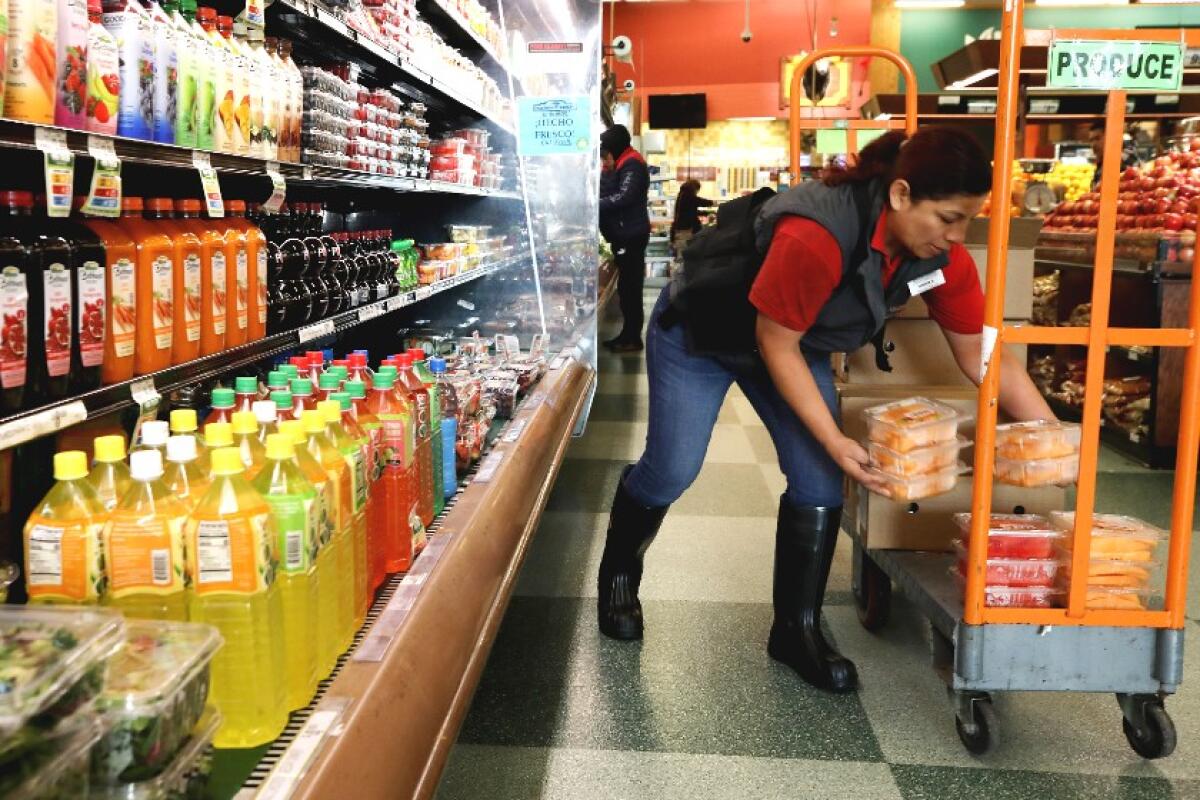
Labor analysts say that, by straining the economy, the virus is exposing how vulnerable many workers are, and not only those who live paycheck to paycheck.
âIt really shows how little social safety net exists and how close to the bone everything is for people up and down the line,â said Toby Higbie, a professor of labor studies at UCLA.
âThat work is not equally distributed across races and gender,â Higbie added, stressing that it is often women and people of color who are most likely to bear the burden.
Three weeks before the president advised Americans to stay home as the coronavirus spread throughout the nation, and before Californians were explicitly instructed to do so, the Centers for Disease Control and Prevention posed a question to the public for the first time: What would it be like if you couldnât go to work or school? How would you prepare for a life interrupted?
But those questions hinged on peopleâs ability to telecommute in order to keep working and to carry on with life. In the days before a new reality set in, workers who could not afford to stay home were seemingly exempt from the conversation and directives from on high.
A Marist poll conducted March 13 and 14 for NPR and PBS found that 18% of adults surveyed already had been laid off or seen a reduction in work hours. Among households earning less than $50,000, 25% saw hours cut or a job loss.
In California, Gov. Gavin Newsom said the number of individuals filing for unemployment insurance had reached 80,000 in one day last week, an exponential increase from the previous daily average of roughly 2,000.
âThe only way out is solidarity.â
— Toby Higbie, labor studies professor at UCLA
Higbie points to the Great Depression of the 1930s and the Great Recession of 2008 as examples of major social disruptions that continued to be felt years later by those who live âcloser to the edge.â
âThe only way out is solidarity,â he said.
Workers throughout the county have launched GoFundMe pages to raise funds for fellow employees as hours dwindle and wages subside. Before L.A. Countyâs directives to close all nonessential businesses, local bookstore workers in Pasadena, Silver Lake and West Hollywood banded together to raise funds while employees took part in a sick-out, refraining from work in order to protect their health.
David Thomas, one of those bookstore employees, said that he can rely on his parents for support if the company wonât give him sick leave. But he worries for others.
âOther people have to pay rent, they have bills. Weâre hoping that the store continues to support us if it does close down,â he said.
In other instances, families are shouldering the totality of the burden together.
Yamilech Trujillo, 21, works at the front desk of a hotel in downtown Los Angeles. Her mom is a housekeeper there and her stepfather is a bartender at a restaurant. Her entire household is facing a total loss in wages.
Trujillo says that the occupancy rate at the hotel has gone down considerably, and she and her coworkersâ hours have been cut significantly. Still, sheâs trying to stay positive, and has been bolstered by the efforts of her union, Unite Here Local 11, which has coordinated workshops to educate those who are facing unemployment.
âItâs a lot to take in, but we have to not panic.â
More to Read
Sign up for Essential California
The most important California stories and recommendations in your inbox every morning.
You may occasionally receive promotional content from the Los Angeles Times.
